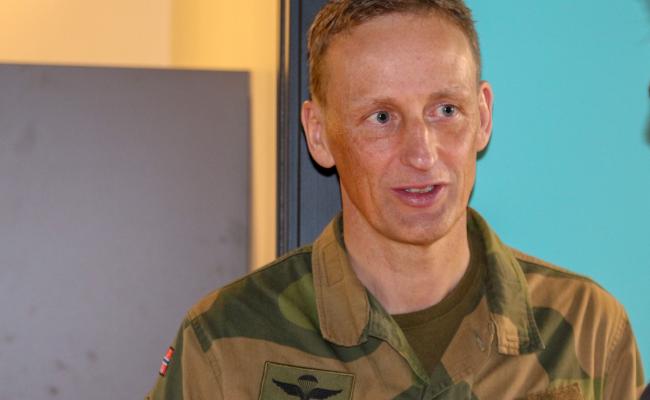The Kirkenes Conference 2025: The Border Municipality Is Fighting for Its Existence: “Anything Is Better Than Nothing”
A crystal clear message from Conservative politician Hans-Jacob Bønå, the Chair of the Finnmark County Government in Northern Norway, from the stage at the Kirkenes Conference 2025: "The crisis is here!" (Photo: Trine Jonassen)
Kirkenes, Northern Norway (High North News): While the Norwegian government is rearming in the North and announcing increased military activity, local businesses are disappearing, and the population is declining, while top politicians are being flown in and out of the region with vague and sweet promises. "We do not need symbolic diplomacy," says the Mayor of Sør-Varanger municipality, that borders to Russia.
Defense is a significant point of investment in Northern Norway at present. Norway will allocate approximately NOK 172 million for defense expenditures this year, according to the revised national budget.
Recently, Norwegian Prime Minister Jonas Gahr Støre (Labor) announced that NATO's third Combinet Air Operations Center (CAOC) will be located in Bodø, and the government proposes an extraordinary increase of NOK 438 million in 2025 for the establishment to not cut into the planned level of activity in the Armed Forces in 2025, or other initiatives in the defense sector's long-term plan.
The Finnmark defense is undergoing significant rearmament, and the current Finnmark Land Defense will be developed into the Finnmark Brigade, comprising six new units in Finnmark that borders to Russia.
Most important?
In addition, Støre said on that there will be increased allied exercises in the North while Russia increases its activity along the border with Norway and Finland, and upgrades its bases in the Arctic.
"The High North is Norway's most important strategic area of investment," repeated Støre from the stage at the recent Kirkenes Conference.
The trust in Russia has been broken for generations to come.
The phrase has lost all its meaning for politicians and businesses in the county and the municipality, located just ten Scandinavian miles from Russia's strategic nuclear weapons.
Hit hard
Finnmark politicians have long sounded the alarm over the negative development in population and investment, and are now settling for whatever measures and support they can get from the government in order for the region to survive.
Sør-Varanger municipality borders Russia in the east and was significantly impacted by Putin's invasion of Ukraine. Businesses that depended on Russian customers lost their foundation for continued business almost overnight.
This is an economic foundation that is not coming back, as illustrated by the dark shop windows and posters announcing "For rent" in the center of Kirkenes.
Not enough
It is not enough that the county government has recently allocated ten million for the development of the Finnmark business sector via Innovation Norway, as well as NOK 20 million for research on ocean resources in the Barents Sea and climate change, believes Hans-Jacob Bønå, Chair of the County Government (Conservative).
Magnus Mæland (Conservative), the Mayor of Sør-Varanger municipality, wants the return of mining. (Photo: Trine Jonassen)
"No matter how the war ends, the trust in Russia has been broken for generations to come," says the Mayor in Sør-Varanger municipality, Magnus Mæland (Conservative).
"What the municipality needs now is a strong population to assert Norwegian sovereignty against the threat in the east. Not symbolic diplomacy. Development and security in the North go hand in hand," says the mayor, who wants to accept investment opportunities from the EU, NATO, and the government.
Shoes on
He is supported by the county chair and his party colleague, Hans-Jacob Bønå, who can confirm that many grand visits from the South "to take a closer look at the situation" have not led to any concrete measures in a region significantly impacted by the new reality.
"We are here and our shoes are on," said Bønå, and added humorously:
"Ready to run..."
Also read (the text cont)
The crisis is here
"It could have very negative consequences for the assertion of sovereignty in the border areas if the trend continues and Finnmark is depopulated, regardless of whether you live in the north or the south," said Bønå.
When both businesses and people flee the region, the county chair believes any measure is better than none.
"Something has to happen now! Give us a tax package, power upgrade, anything! Because the crisis is here. We must do something now. The time of new and endless investigations must come to an end," stated Bønå.
No Finnmark tax
The Finnmark County Government recently voted in favor of a separate tax package for Finnmark. This entails a ten percent lower tax, doubled child benefits, and a minimum of five years of negative employers' national insurance contributions.
This would be in addition to the existing tax benefits and economic incentives of the action zone. The matter went to parliament for a final decision.
No government will implement a Finnmark tax.
The county government could likely have saved itself the trouble.
Zone measures enough
Both the Prime Minister and the Norwegian Fisheries Minister Marianne Sivertsen Næss (Labor) confirmed from the stage in Kirkenes the unlikelihood of a separate Finnmark tax.
"I do not think any government will implement a Finnmark tax," said the Minister of Fisheries and Ocean Policy.
Støre also believes the action zone measures are enough. These benefits apply to the entirety of Finnmard and include a somewhat lower tax rate, free childcare, a gradual write-off of student loans, and exemption from energy and employers' national insurance contributions.
Others also struggling
"I am not convinced. Where would the line of such a tax package go? There are other regions in Norway also struggling with depopulation, such as Østfold [in the south. Red. note]," said Støre.
The Norwegian Prime Minister Jonas Gahr Støre (Labor) in Kirkenes. Before coming to the Kirkenes Conference, he visited the border between Norway and Russia. (Photo: Trine Jonassen)
The labor shortage is precarious, and next year, a silver tsunami is expected to hit the country with such force that it will be impossible to replace the lost labor. And it will hit Northern Norway first.
Finnmark needs attractive workplaces to attract new residents, such as those in the mining industry, which also creates related job opportunities.
Not working
"The action zone is not working," agreed Mayor Magnus Mæland.
"You must have a market for interesting jobs, good housing, and a market to switch partners. Because people do that too," said Mæland, and was met with laughter from the audience.
In other words, there is no shortage of military measures in Finnmark, particularly in Eastern Finnmark, which has become a geopolitical hotspot.
Also read (The article continues)
War rhetorics
What does it entail for the will to invest in the region, which is Norway's sovereignty alibi against an aggressive neighbor, when the prime minister warns against war?
How do you balance rhetoric about being prepared for war while also trying to convince the businesses to stay? asks Editor of High North News, Arne O. Holm.
"What I have said is that one of the threats we are facing is that we can be impacted by war. I do not see that we are facing a military threat in the north today," answers Støre.
"But we must be honest and prepare for the fact that it might impact us, as well."
On a knife-edge
The Finnmark County Mayor, Hans-Jacob Bønå, believes the war rhetoric can go both ways regarding the will to invest and establish in the North.
Finnmark had to build the country.
"It could go both ways, but it feels like balancing on a knife-edge when war is presented as a threat. Because there could just as easily be profiteers who want to make money from facilitating war," said Bønå.
But he also believes that business owners can become anxious about establishing themselves in such a situation.
Wasteful
"When I see that construction and engineering companies are going bankrupt in Finnmark, it is an incredible waste of resources. It has been decided that installations worth NOK 16 billion will be built in Finnmark, in addition to numerous other projects within the construction and engineering sectors. Instead of sitting around and watching the industry being hit by bankruptcies in the NOK 100 million range, we should give them the new projects. It's a waste of time and resources," Bønå told HNN.
Minister of Fisheries and Ocean Policy Marianne Sivertsen Næss (Labor) at the Kirkenes Conference. (Photo: Trine Jonassen)
Has this been communicated to the government?
"Very clearly. But there is a distance between Finnmark and the decision-making authority in the south, and there is a lot that is lost in translation," said Bønå, hinting at Støre comparing Østfold to Finnmark earlier in the day.
Burnt land
There has been no shortage of ministers with entourages in tow in Finnmark in the last couple of years. The county government has spent a considerable amount of time receiving and preparing for top politicians.
Now the county mayor believes that there have been wasted working days.
In addition to tax breaks, what other measures do you think will work?
"A capital fund for Finnmark of around NOK half a billion or a billion to contribute to development and growth. The minister touched on the difference between Finnmark and the counties further south. Other parts of the country continued as before after the war, but Finnmark had to rebuild itself. Here, everything was either burned, bombed, or looted. All family heirlooms and values were gone along with the farm and land."
Also read (the text continues)
Year zero
"That is part of where we are today. We have nothing that has been passed down from one generation to the next. We started at year zero 80 years ago. It is important to understand that this is not long ago."
Bønå does have some faith left, after all, because the government has previously proven what it can do.
In an article in Sør-Varanger Avis, he reminds us of the crisis that also occurred in the late 1990s, as well as the severity of the closure of the Sydvaranger mines.
"The Norwegian Tax Administration was then moved to Bjørnevatn. Around 120 new positions were created, and that was a significant boost. It showed the will to act, and we who live here demand similar impactful deliveries from the government. A viable population in the north is the country's most important protection."





